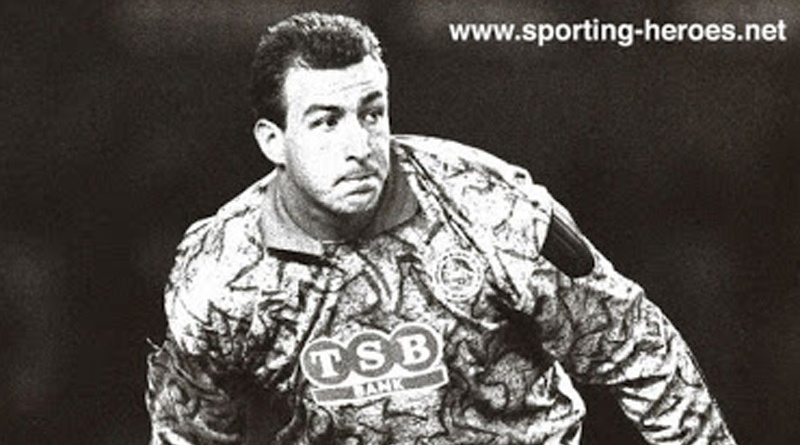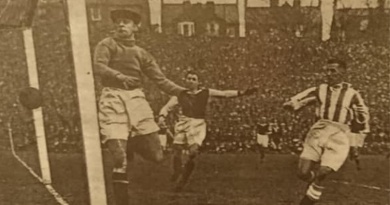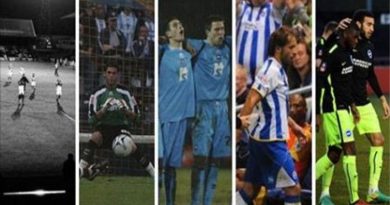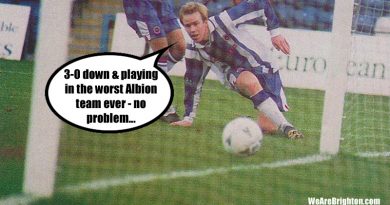The £350,000 transfer deal that kept Brighton in business
To Premier League Brighton & Hove Albion, £350,000 is nothing. The Seagulls will happily splash that on a 16-year-old from Siberia on the off-chance that he might turn out to be good enough to loan to Newport County. It’s a far cry from 1993, when a £350,000 transfer fee received from Leeds United for goalkeeper Mark Beeney prevented Brighton from being liquidated.
‘The most important save in Brighton history’ was how it was described at the time. Yet this pivotal moment in the Albion’s existence often gets forgotten; hardly a surprise given that a much a bigger problem eclipsed it two years later.
Having to sell a goalkeeper to pay the taxman is bad, but it pales into comparison to Bill Archer removing the clause which prevented any individual keeping the club’s assets if it went out of business, selling the Goldstone Ground, pocketing the profits and then trying to drive the club into the grave.
It is a shameful stain on English football that chairmen such as Archer still exist two decades later. Wigan Athletic are the latest club to suffer, their new owner Next Leader Fund having placed them into administration 20 days after buying the club for £40 million.
The EFL’s fit and proper persons test is meant to check if wannabe proprietors have the funds to keep a club afloat for at least two seasons.
Next Leader Fund passed the checks and yet ran out of money in under three weeks. Plenty of rumours abounded about how that was possible, all of which drew the same conclusions – Next Leader Fund were as bent as they come.
With no money to pay their players, Wigan found themselves in a similar situation to Brighton in 1993. Which is why the story of Mark Beeney has come to the fore again – 27 years after Leeds bought a Brighton player to keep the Albion afloat; Brighton have paid £500,000 for the Wigan’s Jensen Weir, enabling the Latics to pay their wage bill for the final two weeks of the 2019-20 season.
The similarities between the two situations don’t end there. Brighton have a good relationship established with Wigan. The Albion bought Dan Burn from the DW Stadium in the summer of 2018 and have Christian Walton, Leon Balogun and Jan Mlakar have all enjoyed loan spells there in recent seasons.
Jensen Weir’s father, ex-Everton defender David Weir, is also employed by the Albion as Pathway Development Manager. Given those connections, you could hardly blame Brighton for wanting to do their bit to keep Wigan alive.
Leeds may not have cared too much for the Seagulls’ fate back in April 1993, but they had a man in the dugout who did. The Champions of Europe’s manager at the time was Howard Wilkinson who had spent five years of his playing career at the Goldstone between 1966 and 1971.
Wilkinson was a popular figure with the Brighton faithful, racking up 147 appearances and scoring 19 times from outside right. Despite that solid service, it was his decision to sign Beeney which was easily his most important contribution to the Albion.
Beeney had arrived at the Goldstone from Maidstone in March 1991 as cover for Perry Digweed. He had a good run in the side in the 1991-92 season before establishing himself as number one in 1992-93, enjoying an outstanding campaign which caught the eye of bigger and better clubs.
Still, nobody needed to buy him. Brighton’s financial troubles were well documented. The Albion had first appeared in the High Court issued with a winding up petition by the Inland Revenue for an unpaid £398,000 PAYE debt on November 13th 1992.
They won an adjournment on that occasion until February 10th 1993. A second stay of execution was then granted until April 21st 1993. Administration was discussed but at a cost of £200,000 and with no willing buyer, that option was seen as simply adding to Brighton’s mounting debts.
The Albion’s third date in court with the Inland Revenue was certain to be their final one. Brighton would be wound up on April 21st, turning every player into a free agent.
Parties interested in Beeney simply had to bide their time, wait for the Albion to go out of business and snap up the goalkeeper for nothing.
It must have come as something of a shock to those at the Goldstone when just days before the High Court appearance, Wilkinson got in touch with his former club. Leeds wanted to buy Beeney and most importantly, they were offering £350,000 there and then for the deal to happen.
Beeney recalled the deal in an interview with The Argus several years later, “Barry Lloyd told me that he had given Leeds permission to talk to me and that he wanted me to negotiate a deal or otherwise Brighton were history.”
“I didn’t really have much choice because if I’d have turned down the chance, I’d have been unemployed anyway with the financial situation at Albion.”
Beeney agreed personal terms with Leeds on April 20th. Barry Lloyd sped over to the Worthing tax office with the ink barely dry on the bank draft, the Albion were able to pay off their original tax bill and the club lived to fight another day.
Further fund raising efforts were still required with Des Lynam famously running a Save Our Seagulls campaign to pay off other creditors, including the police. As part of his efforts, Lynam raised £28,500 in a marathon radio broadcast on Southern FM five days after Beeney made the move to Elland Road.
Beeney was an excellent goalkeeper, but whether he was a £350,000 one – rising to £555,000 with add-ons – is questionable. That fee made him the second-most expensive player ever sold by Brighton behind the £900,000 received for Mark Lawrenson back in 1981. It really was an extraordinary bit of business.
Not that anybody with Brighton connections was complaining. If Wilkinson did pay over-the-odds to his former club, knowing that it would keep them afloat, he never admitted as much. Which kinds of adds to the whole story.
As already noted, even darker days were coming for Brighton. Archer, David Bellotti and Greg Stanley made facing the Inland Revenue in court seem like a walk in a park.
Beeney meanwhile found it difficult to break into the first team at Elland Road. He couldn’t dislodge John Lukic initially and when it looked like he would get a shot at the number one shirt following Lukic’s departure, Leeds brought Nigel Martyn in from Crystal Palace.
Beeney ended up playing just 68 times in six seasons for Leeds, although he still managed to become something of a fan favourite by racking up over 400 games in the reserves without ever complaining about his lack of first team action.
His role in Albion history was far more important. Without Mark Beeney moving to Leeds in 1993, Brighton wouldn’t be able to splash £500,000 on players like Jensen Weir to help keep clubs like Wigan in business in 2020. It really was the most important save of any Albion goalkeeper.




